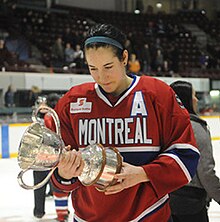
The National Women's Hockey League (NWHL) was a women's ice hockey league established in Canada in service from 1999 to 2007. In its final season the league was run by the Ontario Women's Hockey Association.
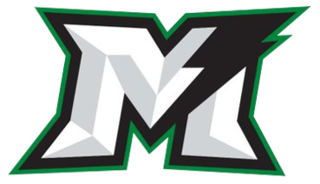
The Markham Thunder was a professional women's ice hockey team in the Canadian Women's Hockey League (CWHL). From 1998 through 2017, the franchise was known as the Brampton Thunder and Brampton Canadettes-Thunder before relocating from Brampton, Ontario, to Markham, Ontario, for the 2017–18 season. The CWHL ceased operations in 2019 and no further statements or actions were taken with the franchise.

The Minnesota Whitecaps were a professional ice hockey team in the Premier Hockey Federation (PHF). They played in Richfield, Minnesota, part of the Minneapolis–Saint Paul metropolitan area, at the Richfield Ice Arena. Established in 2004, the Whitecaps were originally part of the Western Women's Hockey League (WWHL) from 2004 to 2011.
Hockey Canada's Women's National Championship for the Abby Hoffman Cup, sometimes known as the Esso Women's Nationals for sponsorship reasons, was a senior ice hockey championship from 1982 to 2008. The first edition was hosted in Brantford, Ontario from 1-4 April 1982.

The Canadian Women's Hockey League was a women's ice hockey league. Established in 2007 as a Canadian women's senior league in the Greater Toronto Area, Montreal, and Ottawa, the league expanded into Alberta (2011) and internationally in the United States (2010) and China (2017) throughout its tenure. The league discontinued operations on May 1, 2019, after 12 seasons.
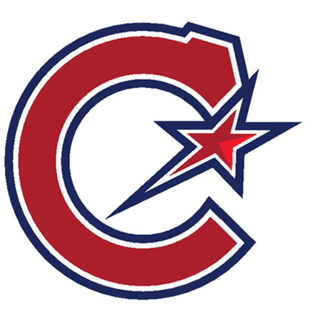
Les Canadiennes de Montréal were a professional women's ice hockey team based in Montreal, Quebec, Canada. Founded in 2007 as the Montreal Stars, they competed in the Canadian Women's Hockey League (CWHL) in every season. The team appeared in and won the Clarkson Cup the most times out of any CWHL teams with four championships.

Brianne Alexandra Jenner is a Canadian professional ice hockey player and captain for the Ottawa Charge of the Professional Women's Hockey League (PWHL) and a member of Canada women's national ice hockey team.

Lisa-Marie Breton-Lebreux is a Canadian ice hockey coach and retired player. Her college ice hockey career was played with the Concordia Stingers women's ice hockey program and she went on to play in the Canadian National Women's Hockey League (NWHL) and was a co-founder of the Canadian Women's Hockey League (CWHL), in which she was both a player and coach.

The 2011 Clarkson Cup was contested at the Barrie Molson Centre in Barrie, Ontario, Canada. The four competing teams included three from the Canadian Women's Hockey League and one from the Western Women's Hockey League. All teams played each other in a round robin Thursday March 24 through Saturday March 26, with the top two teams meeting in the final Sunday March 27. In 2010 the tournament consisted of just two semi-finals and a final. A change to the format this year has made the tournament longer.
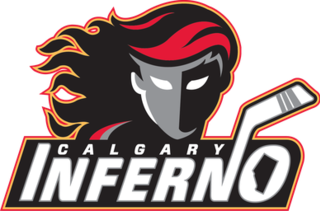
The Calgary Inferno was a women's ice hockey team that joined the Canadian Women's Hockey League (CWHL) for the 2011–12 season. The team played its home games at Joan Snyder Rink at WinSport Canada in Calgary, Alberta. After two seasons without an official name, in 2013 the team picked a moniker drawing from Calgary's National Hockey League franchise, the Calgary Flames, with whom they had a partnership. For the 2013-14 season, it was announced that all Inferno home-games would be streamed live by PCSN.tv.

The Toronto Furies were a professional women's ice hockey team that played in Toronto, Ontario, as members of the Canadian Women's Hockey League. The Toronto Furies played their home games at the Mastercard Centre in Toronto. The team was established in 2010 as an expansion team called Toronto CWHL during a league-wide restructuring. The team adopted the name "Furies" after the 2011 Clarkson Cup.

Erin Ambrose is a Canadian professional ice hockey player for the Montreal Victoire of the Professional Women's Hockey League (PWHL) and member of the Canada women's national ice hockey team. She made her debut with the Canada women's national ice hockey team at the 2014 4 Nations Cup.

Jillian T. Dempsey is an American professional ice hockey player for the Montreal Victoire of the Professional Women's Hockey League (PWHL). The former captain of the Boston Pride of the now-defunct Premier Hockey Federation (PHF), she holds the all-time PHF records for games played, goals, assists, and points, and is one of only two players to have won the Isobel Cup three times.
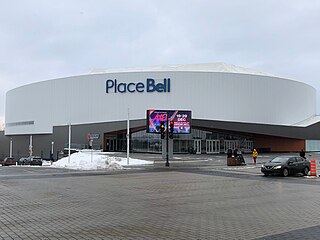
Place Bell is a multi-purpose arena in Laval, Quebec, Canada. The complex includes a 10,000-seat main arena, which is the home of the Laval Rocket of the American Hockey League (AHL), and two smaller community ice rinks, one of which has Olympic-size ice. The arena was also home to Les Canadiennes de Montréal for the final season of play in the Canadian Women's Hockey League (CWHL). The arena hosted select games for Montréal Victoire of the Professional Women's Hockey League (PWHL) during the inaugural 2023–24 season, and became their permanent home for the 2024-25 season.

Emerance Maschmeyer is a Canadian professional ice hockey goaltender for the Ottawa Charge of the Professional Women's Hockey League (PWHL). She is also a member of Canada women's national ice hockey team, with whom she won the gold medal at the 2021 IIHF Women's World Championship and the 2022 Winter Olympics. She first made her debut with Team Canada at the 2014 4 Nations Cup.

Kateřina Mrázová is a Czech professional ice hockey forward for the Ottawa Charge of the Professional Women's Hockey League (PWHL) and a member of the Czech Republic women's national ice hockey team. Known for her stickhandling skill, she was the first European player to win the Clarkson Cup, winning the championship with the Boston Blades in 2013, and the first Czech player to score a goal in the National Women's Hockey League.

The Lady Isobel Gathorne-Hardy Cup, often shortened to Isobel Cup, is the championship trophy that was awarded annually to the now defunct Premier Hockey Federation (PHF) playoff winner. The trophy is named after Lady Isobel Gathorne-Hardy, the daughter of Lord Stanley—former Governor-General of Canada and namesake of the Stanley Cup—and one of the first women known to play the game of ice hockey.
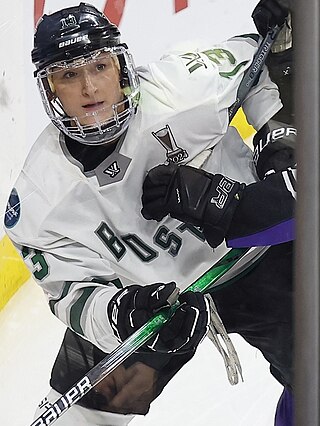
Kaleigh Fratkin is a Canadian professional ice hockey player for the Boston Fleet of the Professional Women's Hockey League (PWHL). The second-longest tenured player and leading scorer among defenders in PHF history, she was the first Canadian player to sign a contract in the league, is a five-time PHF all-star, and is a two-time PHF Defender of the Year in 2020 and 2021. She was also a member of the Boston Pride roster that captured the 2021 and 2022 Isobel Cup, and was one of three 2023 PHF All-Star captains. Previous to the joining the NWHL, she won the Clarkson Cup in 2015 and was the first girl to play boys' midget AAA hockey in British Columbia.

The collapse of the Canadian Women's Hockey League occurred in the spring of 2019. Previously one of the top women's ice hockey leagues in the world, the Canadian Women's Hockey League announced on 31 March 2019, that it would be folding effective 1 May.
